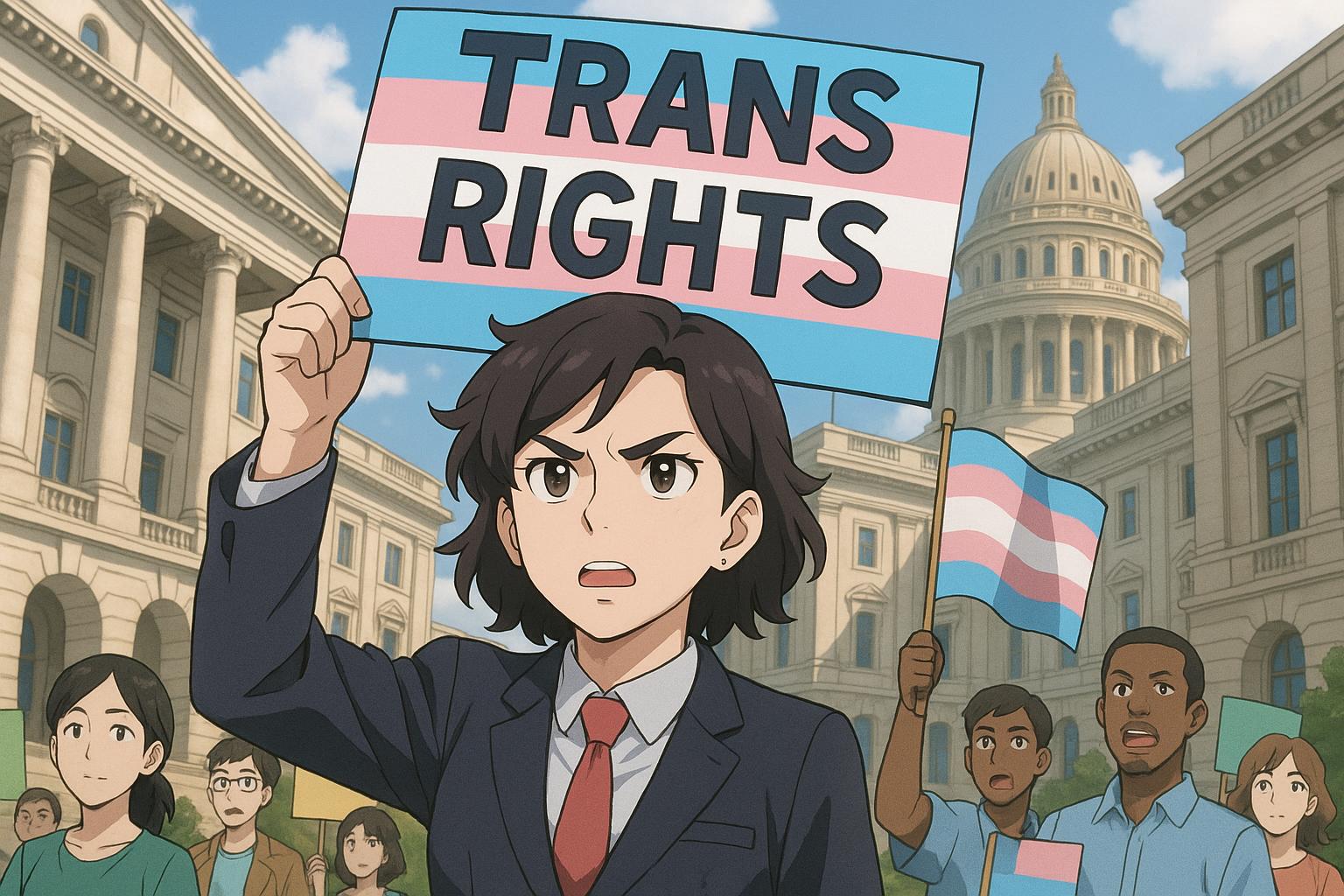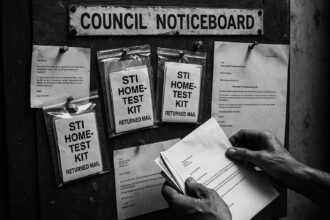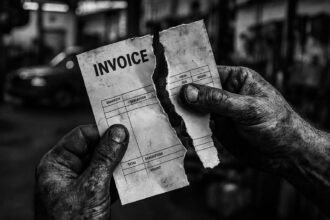Tensions escalate within the UK civil service as PCS union members prepare to strike and pursue legal action in response to government measures seen as restricting transgender and non-binary employees’ access to gendered facilities and legal recognition.
Civil servants are on the brink of striking and pursuing legal action against governmental policies that critics argue undermine the rights of transgender and non-binary employees. Activists within the Public and Commercial Services (PCS) union have expressed deep concern over guidance perceived as effectively segregating trans individuals in essential workplace facilities, such as toilets and changing rooms. This initiative has escalated tensions throughout Whitehall, with union representatives claiming to safeguard the rights of all members, particularly those from marginalised backgrounds.
The backdrop of this conflict includes a recent Supreme Court ruling mandating that transgender women use male facilities. This decision has sparked outrage among PCS members, who view it as an improper application of biological essentialism. At their upcoming annual conference, a motion is set to be presented that claims “LGBT+ and women’s liberation are interlinked,” warning against policies that undermine the rights of trans and gender non-conforming workers. The notion that gender identity could be defined strictly by biological factors is increasingly seen as outdated and damaging by many within the civil service.
Furthermore, the motion raises alarms over the flawed methodology of the Cass Review, which has drawn criticism for its approach to assessing gender treatment for children. While advocates demand a more nuanced strategy prioritising the well-being of trans youth, the Health Secretary’s endorsement of a ban on puberty blockers casts a chilling shadow. Such policies could signal a broader reluctance to meet the healthcare needs of transgender individuals, exacerbating existing tensions.
Adding to the complexity, a motion from the Department for Work and Pensions branch in Edinburgh advocates for equal access to all services consistent with one’s gender identity. This includes a push for individuals to self-determine their legal gender without encountering unnecessary obstacles or medical prerequisites.
Nevertheless, dissenting voices are emerging, such as Helen Joyce from the charity Sex Matters, who contends that classifying single-sex facilities as mere segregation undermines the vital need for safety and privacy among women. This viewpoint underscores the divisive nature of current debates, as critical discussions surrounding sex and gender increasingly intersect with issues of safety and institutional accountability.
Yet, calls for change have gained traction through broader union movements advocating for trans rights. The Trades Union Congress (TUC) recently launched the Trade Unions for Trans Rights Network, reinforcing a collective dedication to advancing trans rights amid rising hostility from parts of society. This network seeks to unite various unions in opposing discrimination and safeguarding trans liberation in workplaces and beyond.
Concerning developments have emerged regarding the treatment of transgender employees within governmental departments. Leaked draft policies suggest plans to limit access to gendered spaces unless a Gender Recognition Certificate (GRC) is presented. Such moves raise alarming concerns about the rollback of rights and protections previously afforded to trans staff. Responses from government bodies, including the Department for Education, have condemned these proposals as both unacceptable and unlawful, stoking fears of a larger institutional crisis over trans rights within the civil service.
As civil servants gear up for pivotal discussions at their conference, the implications of these actions could resonate far beyond workplace dynamics. The PCS union’s stance may not only shape the environment within its ranks but also illustrate a shifting societal perspective on transgender rights in the UK. With a landscape fraught with ongoing legal challenges and public scrutiny, advocates continuously push for a narrative of understanding and inclusiveness. However, as the new government pivots towards policies perceived as restrictive, the path ahead seems increasingly perilous for those advocating for true equality and representation.
Source: Noah Wire Services
- https://www.dailymail.co.uk/news/article-14717831/Civil-servants-threaten-strikes-transgender-toilets.html?ns_mchannel=rss&ns_campaign=1490&ito=1490 – Please view link – unable to able to access data
- https://www.pcs.org.uk/news-events/news/conference-votes-campaign-trans-rights – In May 2024, the Public and Commercial Services (PCS) Union’s annual conference passed a motion highlighting the importance of defending trans and non-binary rights. The motion criticized proposals that would marginalize these groups, particularly in educational settings, and called for active opposition to such guidance. It also addressed the Scottish government’s gender recognition reform and the subsequent legal challenges, emphasizing the need for a united working-class movement to combat all forms of oppression and discrimination.
- https://www.pcs.org.uk/equality/lgbt – The PCS Union’s LGBT+ section, known as PCS Proud, is dedicated to challenging all forms of hate, prejudice, and discrimination. It represents members who identify as lesbian, gay, bisexual, trans, or other non-heterosexual orientations. PCS Proud works to raise awareness of LGBT+ issues, supports LGBT+ members within the workplace and broader community, and engages in various activities, including attending local Pride events and organizing union participation in these events.
- https://www.telegraph.co.uk/news/2023/09/22/radical-ideology-gender-race-civil-servants-lgbtq-trans/?utmsource=email – In September 2023, The Telegraph reported on concerns within the Department for Environment, Food and Rural Affairs (Defra) regarding diversity training materials. The training videos depicted scenarios where transgender individuals faced inappropriate behavior, highlighting the challenges transgender people experience in the workplace and daily life. The report emphasized the need for inclusive and respectful environments for all employees, particularly transgender individuals.
- https://www.tuc.org.uk/blogs/trade-unions-are-fighting-trans-rights – In May 2023, the Trades Union Congress (TUC) launched the Trade Unions for Trans Rights Network, a campaigning network committed to organizing for trans rights at work and in wider society. The network was established following supportive motions from unions like the University and College Union (UCU) and others, aiming to address the increasing normalization of hostility towards trans people in the UK and to support trans liberation.
- https://www.vice.com/en/article/leaked-document-exposes-transphobic-draft-guidelines-for-uk-civil-servants/ – In July 2023, VICE News reported on leaked draft policies for UK civil servants that proposed restricting some trans staff from using single-sex spaces such as toilets. The leaked 39-page document outlined changes to the Civil Service’s ‘Gender Identity and Intersex policies,’ including requiring a Gender Recognition Certificate (GRC) for access to certain facilities. The report highlighted concerns among civil servants about the potential impact of these policies on trans employees and the broader work environment.
- https://www.thepinknews.com/2023/07/16/civil-service-draft-gender-policy-trans/ – In July 2023, The Pink News reported on criticism from officials at the Department of Education regarding the civil service’s draft gender policy. The officials published an open letter condemning the proposed policies, particularly the plans to restrict trans staff’s access to single-sex spaces, as ‘completely unacceptable as well as unlawful.’ The report underscored the ongoing debates and concerns within the civil service about the treatment and rights of trans employees.
Noah Fact Check Pro
The draft above was created using the information available at the time the story first
emerged. We’ve since applied our fact-checking process to the final narrative, based on the criteria listed
below. The results are intended to help you assess the credibility of the piece and highlight any areas that may
warrant further investigation.
Freshness check
Score:
6
Notes:
The narrative references a recent Supreme Court ruling and current government policies around transgender rights, as well as a recent Trades Union Congress (TUC) initiative, suggesting contemporaneity. However, some elements like the Cass Review and Health Secretary’s stance on puberty blockers have been ongoing topics for years, which could indicate partial recycling of older debates. No explicit press release format detected, which usually scores higher for freshness.
Quotes check
Score:
7
Notes:
Direct quotes such as the motion ‘LGBT+ and women’s liberation are interlinked’ and Helen Joyce’s remarks are cited but no earliest known references or original sources for these quotes were found online in the search results. This may indicate either first public usage in this narrative or lack of prior online sourcing, slightly boosting the freshness but limiting verifiable origin.
Source reliability
Score:
5
Notes:
The narrative originates from a publication with a sensationalist reputation and mixed reliability. It covers complex socio-political issues around trans rights and union actions but lacks corroboration from highly reputable or official outlets based on the search results. This reduces confidence in accuracy, requiring caution.
Plausability check
Score:
8
Notes:
Claims about union activity, legal challenges, and transgender rights in UK public service align with known ongoing societal and political developments. The described tensions and motions are plausible given recent trends and debates, though some specific details like leaked draft policies remain unverifiable independently.
Overall assessment
Verdict (FAIL, OPEN, PASS): OPEN
Confidence (LOW, MEDIUM, HIGH): MEDIUM
Summary:
The narrative presents plausible current events concerning transgender rights and union responses within UK civil service, reflecting ongoing debates. However, the reliance on less authoritative origins and absence of verifiable earliest sources for quotes temper full confidence. There is no clear evidence of outdated or recycled content but some themes have persisted over years. Overall, the story seems credible yet requires corroboration from more reliable and official sources for a full pass.













